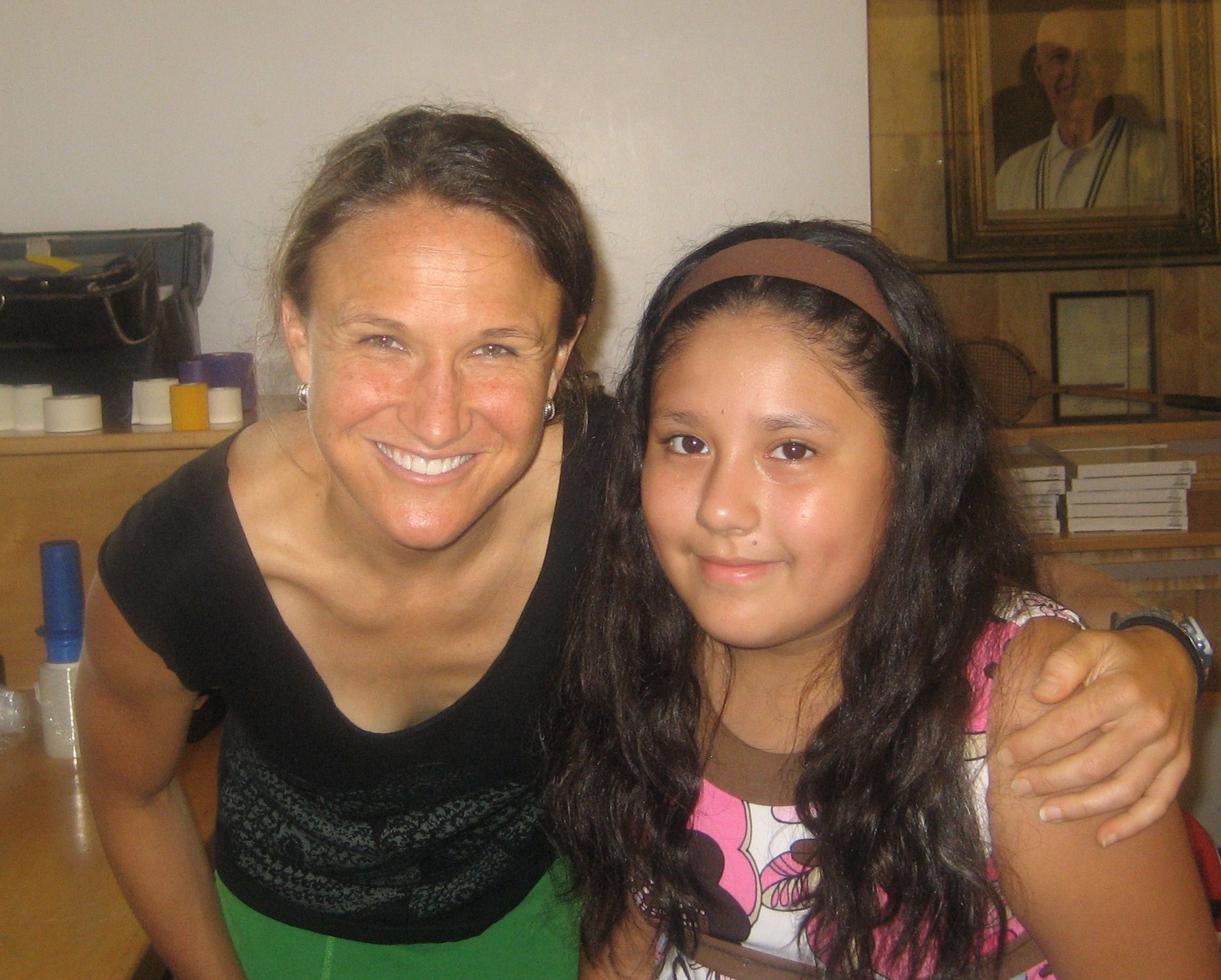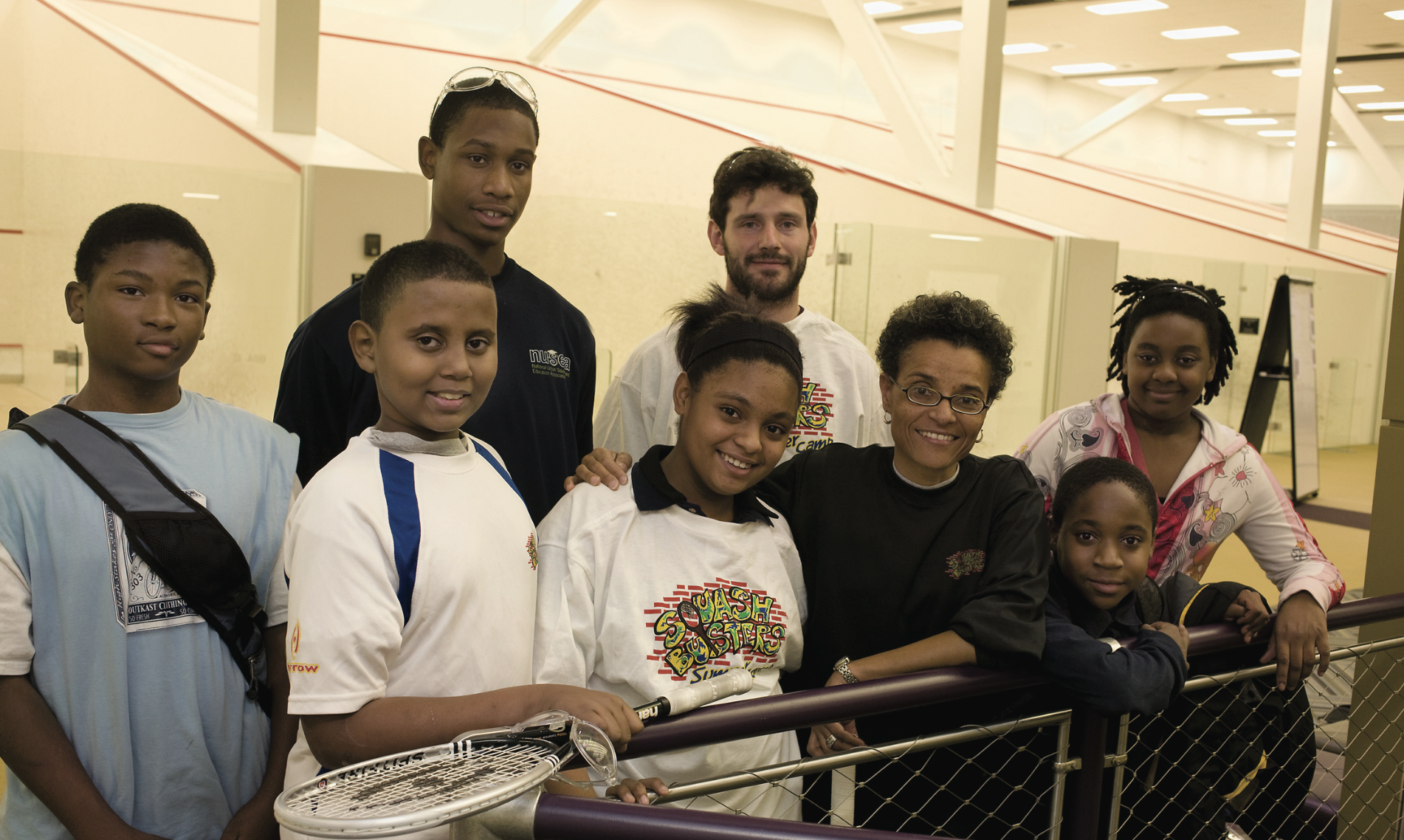
By Jennifer Gabler
Photos courtesy of U.S. Squash
Urban Programs In General
Since 1996, the squash community has been assisting inner-city middle and high school students through programs known as “urban squash.” SquashBusters in Boston was the original program, combining equal parts of academic tutoring and squash coaching in an after school program for public school students who typically would never have even heard of, much less participated in, squash. The focus was not to make squash superstars or even varsity athletes, but as Teresa Soares-Pena, the current Executive Director of SquashBusters said, “To give kids strategies so they can take full advantage of any opportunities that come their way.” These strategies are developed through competitive play, mentoring and community building. The programs teach them to be problem-solvers, risk takers and self-reliant at school, in their family unit and in their community.
Greg Zaff, George Polsky, Steve Gregg and Tim Wyant, the Executive Directors of SquashBusters, StreetSquash, SquashSmarts and CitySquash partnered with U.S. SQUASH and formed a formal umbrella organization in 2005 to set standards and aid in the development of new programs. The National Urban Squash Education Association (“NUSEA”) oversees the five established programs and other emerging programs around the country.
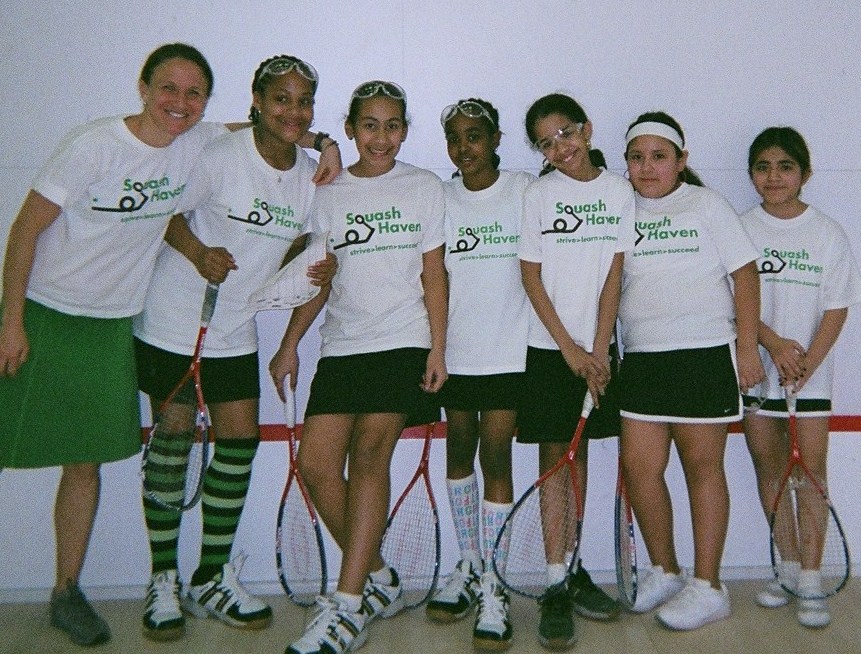
Women Leading Urban Programs
Three of the nine executive directors at the Urban programs are women, and their stories, challenges and successes give an intimate portrait of how these programs are helping kids every day. Julie Greenwood heads up SquashHaven in New Haven, a program based at Yale University. Julie comes from a squash coaching/university administrator background. Teresa Soares-Pena leads the original and oldest program, SquashBusters in Boston. She was an elementary school principal with no former connection to squash when SquashBusters hired her. Abby Markoe is the new Executive Director of SquashWise, which is in its first year of existence in Baltimore. Abby is a former collegiate player and academic.
Each of these women has somewhat different short-term goals for each of their programs, driven by their different stages of development and settings. Yet, all share a common purpose as it relates to the kids. As Julie said, “The program is a values-based program which should nurture kids and support individual development. The values we are trying to build include teamwork, taking responsibility and hard work.” Later goals for the kids according to Teresa are “100% of the kids going to some post-secondary program, either college or career training. Just ending your education at high school is no longer sufficient in today’s world.” Over the next couple of years, Abby will prepare students for the high school transition process. But in the short-term, she emphasizes the link between school and SquashWise. She said, “The students know that SquashWise isn’t only about squash—it’s about schoolwork, respect and attitude. I always remind the team that their eligibility to participate in squash is dependent on their behavior and attitude at school. The idea is that the SquashWise values should transfer to school and to life in general.” To maintain this link, Abby visits the school regularly to meet with teachers and administrators, who give her updates on student performance.
The key qualifications for leading an urban program, which all three of these executive directors have plenty of, are a positive get-it-done attitude, creativity and excellent communication skills.
Julie Greenwood, SquashHaven, New Haven, CT
Julie Greenwood grew up in Philadelphia playing tennis. She went to Williams College where she worked her way up the squash ladder and was named an All-American her sophomore, junior, and senior years.
Her first job was in admissions at Williams, after which she was hired as the interim tennis and squash coach covering for the coach who was out on maternity leave. She was named the women’s varsity tennis and squash coach permanently at the end of that year. After her fifth year coaching, she took a one-year sabbatical to pursue a master’s degree in education at Stanford.
She returned to Williams and continued to coach women’s tennis and men’s and women’s junior varsity squash. In addition, she took on the role as Acting Senior Women’s Athletics Administrator. Coaches at Williams are faculty and wear many hats. Julie taught PE classes, served on faculty committees, and was a first year advisor. She also oversaw the Athletic Department’s community outreach and student leadership council.
Greg Zaff, the founder of Squash Busters and who went to Williams, used to bring SquashBusters kids up to Williams to play in the Purple Cow tournament and Julie always found the urban program concept intriguing. During the summer of 2006, while Williams was on summer break, she was living in Brooklyn for the summer and also saw CitySquash in action and met with Tim Wyant who leads that program. In December 2006, she ran into Greg in Boston and he talked to her about the new urban programs getting started in San Diego and New Haven. The idea of helping to start and run a new urban program was compelling to her.
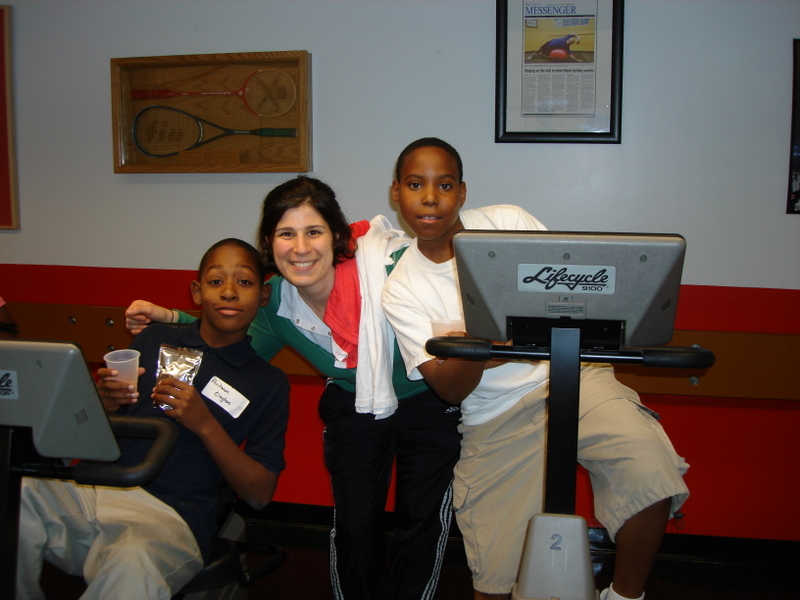
She decided to jump on board and help start SquashHaven, and was hired in February 2007 as the Executive Director. Her first year, she ran the selections for the team in June 07 and started running the program in September 07. She was able to hit the ground running due to the work of board members who had already preliminarily researched and selected the partner schools and had secured space at Yale. During their first year, SquashHaven had 28 kids and a part-time academic person. For this current academic year, 08/09, Julie has added eleven new fifth and sixth grade students and now has a full-time academic person. Dave Talbott, the Yale Squash Coach, has been very instrumental in helping SquashHaven get started, securing courts and space and having the Yale Squash Team help in running the program.
Julie feels that one of the most special and unique things about SquashHaven is being embedded in the Yale Community, where the kids are exposed to great role models and the program has a great volunteer pool to draw on. One of Julie’s goals is to expand the academic offerings. This year the kids have electives in Latino culture and history and newspaper reading and writing.
Teresa Soares-Pena, SquashBusters, Boston, MA
Teresa Soares-Pena may be relatively new to squash but she brings a strong background in public urban education to the “grandfather” of all the urban programs, SquashBusters based in Boston, MA. She was a teacher in the Boston Public School System, then an assistant principal in a public school in California. She came back to Boston to be the principal at Dearborne Middle School in Boston. She had had heard about urban squash programs and wanted one for her school. She has always worked hard to extend the school day for her kids so they would not just go home and hang out. As she said, “My kids don’t go home to the plethora of activities that more privileged kids get to do.” She viewed being a partner school with SquashBusters as a lifetime opportunity to get 10-12 kids every year involved in a program that would expose them to another world beyond their neighborhood and allow them to have fun. Even though she is not a squash player, she has played tennis, loves sports and sees the benefits of being involved in competitive play and the life lessons that sports teach.
SquashBusters has its own facility, which it shares with Northeastern University. It includes eight courts, classrooms and conference rooms. Northeastern has built a fitness center on the top floor that SquashBusters can also access. The sharing of a facility is really just a baseline. Beyond that, Teresa has access to volunteers for coaching and academics, and the curriculum departments at Northeastern have reviewed the SquashBusters study program. SquashBusters has a staff of ten people (academic coaches, squash coaches, psychologists, administrators), and carries a team of 108 kids in grades six to twelve.
In her first year, Teresa faced a huge learning curve. Fundraising and budgeting were new. The autonomy of managing a small organization was very different from the bureaucracy of the school system. She had to come up with her own policies, be much more creative and “in a smaller organization, if things weren’t working then we felt the pain right away.”
With her elementary education background, Teresa is carefully reviewing the SquashBusters academic program. As one of the oldest programs, they have done many different types of academic offerings, including organization classes, test preparation and team building exercises. Currently, they are moving toward experiential units on art, nutrition and science that meet state standards, reinforce skills used in their regular school classrooms but do not duplicate what the kids are doing in school. During the art strand, the kids will learn about artists by conducting their own research, go to museums, make presentations and meet with artists in their studios. Seniors in high school focus on resume writing, college applications, building their portfolios and interview skills.
Teresa’s main objective is to make a difference in kids’ lives each day. She also would like to get 100% of her kids to graduate from high school and then go on to further job training or college. SquashBusters currently has nine of their alumnai (NOTE: BILL–THIS HAD SAID “ALUMNAE” BUT THAT MEANS GIRLS OR WOMEN ONLY AS A REFERENCE) placed in preparatory or parochial schools and last year all three seniors went to college, two to Wellesley and one to UMass/Amherst.
Teresa knows first hand how urban programs are bringing opportunities to kids who might never have had them.
Abby Markoe, SquashWise, Baltimore, MD
Abby Markoe has always shown determination and perseverance. She learned squash in middle school from her father and got to George Washington University (GW) where there was no women’s team. There was a men’s squash club, which she tried to join, but the men’s coach at that time turned her away. While she was at a university function, she discussed her squash dilemma with the university president, he intervened and she began a successful stint as the sole woman on the men’s squash club. She enjoyed the camaraderie of the team which was self-coached, and she went on to be a founding member of the 2002/03 women’s varsity team when it was formed in her senior year.
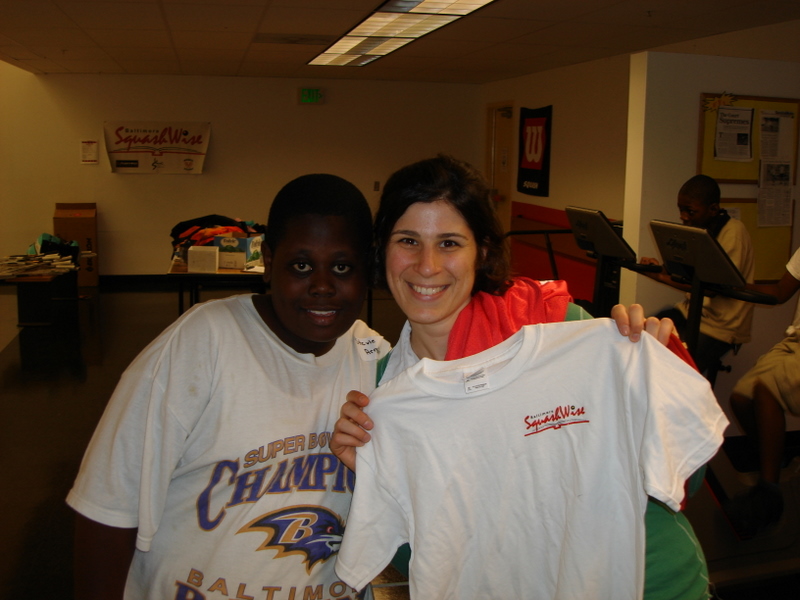
She is definitely not afraid of new experiences and wants to help others. She majored in history and philosophy of medicine at GW, traveling across Southern Africa to round out her studies. In 2003, she moved to New York and worked at an organization developing an HIV vaccine. She then headed to Johns Hopkins where she completed a Masters in Health Sciences and is in the midst of pursuing a PhD in the history of medicine. She decided to take a break from her studies when the opportunity came up to help start SquashWise.
Abby had heard about SquashBusters and the urban program model and was interested in starting a program in Baltimore. In the spring of 2007, she discovered that Charlie Wise, a local businessman, was working on a parallel path. She teamed up with Charlie and during 2007/8, they worked with NUSEA, worked on fundraising, and developed their board and partnerships. In August 2008, Abby was named Executive Director.
The partner school they chose did not have an after school culture, so Abby knew she would need to work hard to promote the program to parents, teachers and students. Their host facility is Meadow Mill Athletic Club, which already had experience with the urban squash concept. Meadow Mill had already started a foundation and program to expose kids from an inner-city charter school to squash. Meadow Mill agreed to host the SquashWise program in their facility, on top of their charter school program and all of the other junior programs it hosts.
From September to November of this year, Abby has been busy building momentum at her partner school among the kids, educating parents and running try-outs for her first team. She began that process by introducing squash at the school gym and visiting the school regularly to create a buzz about the program. She became a local “celebrity.” When she entered the building, kids and teachers would say, “Here comes that squash lady again.” She was persistent which led to a very enthusiastic turnout for the tryouts, and Abby is optimistic that SquashWise will have a solid program in its first year with 16 sixth graders on the team.
SquashWise is continuing a wonderful urban squash trend. One of the original graduates of SquashBusters, Natalie Fontanes, recently wrapped up a two-year stint coaching the sixth and seventh grade team in Boston. Abby has hired a StreetSquash graduate, Taralyn Gonzalez, who is a junior at Morgan State in Baltimore as a part-time coach for SquashWise. So it all comes full-circle with fantastic role models coaching kids and showing them where this program can lead them.
Abby feels very fortunate to be embedded in the Baltimore squash scene. She has many volunteers (including several high school teams), junior squash is very strong and her partnerships are solid. Her short-term goals include getting the first year class to be the ambassadors at school, which will attract her next class, and bridging communities by bringing private schools in touch with public schools and having donors and business leaders connect with parents. She wants to make the volunteer experience meaningful for the kids from the private school teams and help them gain perspective about their privilege in life. Little things like realizing the urban squashers often face transportation issues, make the private school kids realize they are lucky to have parents who are able to transport them regularly to activities. She wants to help the urban kids improve their grades through better organization, better attention and attitude at school. Her longer-term goals include bringing on a new team of 16 kids every year, bringing on another partner school and some day getting her own facility. Every day she passes an abandoned warehouse and thinks, “That could be the permanent home for SquashWise.” She’s got a lot to do, she’s definitely got the enthusiasm and she’s off to a great start.
Challenges of Running An Urban Program
All of the executive directors have had to face significant challenges on a day-to-day basis. Teresa cited the current economic downturn as potentially impacting fundraising, which their programs rely completely on for financial viability. Abby has felt the economy’s downturn already in day-to-day operations, as her partner school has had to make cutbacks and transfer teachers, which makes life even more challenging for her kids. A universal challenge for urban programs, one many of us might not think of initially, is transportation. Most of the programs do not have vehicles, so getting from school to the program and then home again sometimes poses an insurmountable hurdle, which precludes some kids from participating. In many urban schools, there is no culture of after school programming and in many cases parents or guardians work so having kids travel at night in some neighborhoods is just not safe. And this does not even address the challenge of getting the kids to their competitive matches in other cities. Abby was originally despondent when a kid that would have benefited from the program was unable to participate based on transportation challenges. She came to accept this limitation and not be discouraged by the fact that one kid was missing out on participating in SquashWise, but instead focused her energy on the fact that all kids can benefit from having SquashWise in their community

Rewards of Running an Urban Program
The most rewarding aspects of running an urban program for Greenwood, are “seeing student growth and development. These programs expose kids to worlds they have never seen before. Every day at practice, team members are working with students, professionals, and academics from one of the most renowned universities in the world. In the past year, our kids have gone to the theater, symphony, and museums. They have made new friendships that transcend traditional race, socioeconomics, age, and geography. The cumulative effect of that exposure over time is incredibly powerful, and I take great joy in the daily process of making change happen.” Abby and Teresa agree that working with the kids is the most invigorating aspect of running an urban program. Teresa boils it all down to relationship building. “I took this job because I saw an opportunity to continue building relationships with kids I knew in 6th grade who are now in high school. The best way to support kids is to help them do better in every part of their life.”
Abby also loves that she gets to be creative in designing the program and the diversity of tasks in every single day. “On October 20th, I was up at 6am being interviewed on the morning news. After the news interview, I went to our partner school to handout permission slips to the kids, met with a grandmother at her home and later in the afternoon stopped by to meet with potential donors. At 7pm, I met with parents to talk about our upcoming tryouts and about the program in general.” Abby enjoys the media and public relations aspects, and she clearly is good at it too. “One interviewer said, ‘We can sense your passion about SquashWise.’ I was just talking about the program and I got that response because I love to answer questions about SquashWise.” Being one of the founding members of Squash Wise has been exhilarating also in that she is creating something from scratch and is actively involved in setting the tone for the organization from day one.
Julie thinks it has been “good for boys to see a woman coaching and good for girls to have a female athletic role model. Squash in general and these programs in particular have given me and all women increased opportunities.”
Teresa was originally not from the squash world but is amazed how the squash community supports and embraces these programs. “People really care. We are very dependant on the altruism of squash people. Squash is an elite, expensive sport but has supported this program that is changing the face of squash forever. Our kids would never have access to this world. Through this access they are learning to relate to people who are different but yet the same.”
While the kids in the Urban Programs will certainly not win every squash match they play, these three Executive Directors are seeing to it that the kids do learn to win at life.


